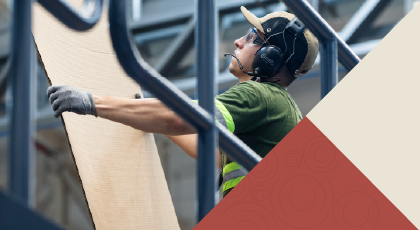Emissions management
Emissions management
In 2024, absolute greenhouse gas emissions from scopes 1 and 2 were reduced by 13.2% compared to the 2022 baseline year. This evolution was in line with the Company’s expectations, considering the Ortigueira Plant’s stabilization phase, following the capacity increase under the Puma II Project. The primary focus during 2024 was on the completion of expansion projects and optimization of operational controls. Another significant initiative was a successful trial to replace fossil fuels with bio-oil in the lime kilns at Monte Alegre Plant in Telêmaco Borba, Paraná. The experience was well received, obtained an environmental license, and the project is now in the feasibility analysis phase for potential future implementation.
Technological upgrades at the mills, such as the installation of the new recovery boiler at the Monte Alegre Plant, also provide a positive outlook for CO₂ emissions reduction in the coming years.
Klabin invests in technologies that optimize the use of natural resources and minimize environmental impacts. All the Company’s plants have equipment and systems to control air emissions. To comply with applicable environmental requirements, monitoring systems (continuous or discontinuous) are applied to emission sources. Nitrogen oxides, particulate matter, sulfur oxides and volatile organic compounds are among the types of emissions monitored.
Reduction in Scope 3 greenhouse gas emissions
Involving the value chain in the Company's target for reducing Scope 3 emissions is a challenge. In 2023, Klabin implemented its Climate Change Value Chain Engagement Program and since then it has been encouraging partners to assess their own impacts and seek to decarbonize their processes. More than 200 of the Company’s partners (including suppliers and customers) are part of this group, with different levels of maturity with regard to decarbonization – while some partners still need support to start drawing up a GHG inventory, others already have science-based targets.
From 2022 (the base year for the new target approved by SBTi) to 2024, Klabin achieved a 17.4% reduction in Scope 3 emissions.
Fluff pulp with reduced carbon footprint
Klabin demonstrates its decarbonization commitment and delivers value to its customers by making products with a reduced carbon footprint. Last year, for example, a study showed that PineFluff® pulp has a 62% lower carbon footprint and PineFluff eXcel® has a 64% lower carbon footprint compared to fluff pulp produced in the southeastern United States, shipped out from the port of Savannah, Georgia.
This study quantified greenhouse gas emissions generated throughout the fluff pulp life cycle, considering energy, materials and inputs used in forest cultivation, product manufacturing and transportation. Conducted in partnership with consulting firm ACV Brasil, a life cycle assessment specialist, and validated by SGS Brasil, a global leader in testing, inspection and certification, the study followed the GHG Protocol’s Product Life Cycle Accounting and Reporting Standard, as well as the ISO 14040 and 14044 standards from 2009.
Energy
Since 2023, Klabin has been exceeding the target in its Sustainable Development Goals set for 2030, which aimed for renewable sources to account for 92% of its energy supplies. In 2024, the Company continued to surpass this target, achieving a rate of 93%. Although no new projects were implemented, the period was marked by the stabilization of the production process at the Ortigueira Plant, following the completion of its gasification plant as part of the Puma II Project.
“Klabin takes the issue of decarbonization seriously, does its part and will continue making strong progress in this direction. This has also been a financial opportunity for us, as we have invested in continuous improvement projects based on renewable fuels, which have proven to be more economically efficient than fossil fuels. These are opportunities to integrate our chain with our forestry base, using wood waste and byproducts to improve our energy supplies.”






